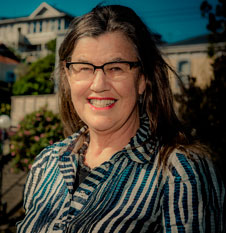 Monday 25 February 2019 3:00pm
Monday 25 February 2019 3:00pm
Dr Lynn Riggs
Preventable injuries and hospitalisations due solely to poor housing conditions in New Zealand could be costing more than $145 million annually in ACC claims and hospitalisation costs, according to new research.
A Fellow at Motu Economic and Public Policy Research, Wellington, Dr Lynn Riggs, who carried out the study together with researchers from He Kainga Oranga, the Housing and Health Research Programme, based at the University of Otago, Wellington explains these costs are solely attributable to homes that are cold, damp, mouldy or dangerous to live in.
“That's not even counting additional costs that occur due to illness and injury caused by poor housing conditions or the associated costs to society more broadly,” Dr Riggs says.
She presented the results today at the University of Otago, Wellington's Public Health Summer School. The day-long event is hosting the Southern Hemisphere launch of the new World Health Organization Housing and Health Guidelines.
Otago professor leads development of international guidelines on healthy housing

Professor of Public Health, Philippa Howden-Chapman
University of Otago Professor of Public Health, Philippa Howden-Chapman, is a co-author of the research and chair of the international guidelines group. The guidelines were developed because WHO members recognise the importance of housing to health due to demographic and climate changes, she says.
“The guidelines are a world-first and bring together the most recent evidence to provide practical recommendations on how to improve housing conditions.
“We are hopeful the guidelines will assist in helping to turn around the type of preventable health costs identified in this latest research.”
Research done in New Zealand before now has generally focused on the effect of a single housing condition on health outcomes and the associated burden of disease. The research published today builds on that research to estimate the combined burden of disease from multiple housing conditions – damp, cold, mould, and disrepair.
The study found that homes that are damp or mouldy cause more than 35,000 nights in hospital with an associated cost of around $35 million. A total of 32 per cent of homes in New Zealand report problems with damp or mould.
“However, that $35 million does not include, for example, costs of time lost from work or school while patients are in hospital, nor does it include GP visits or pharmaceutical costs,” Dr Riggs says.
Unsurprisingly, the statistics are worse the lower the income of the household and rental properties are most problematic.
“In the year from April 2014 to March 2015, 15 per cent of owner-occupier homes were reported to be cold, compared to 35 per cent of rental homes. Three per cent of owner-occupied homes were damp or mouldy compared to 12 per cent of rentals,” Dr Riggs explains.
In addition, household crowding causes more than 3,500 nights in hospital and costs nearly $5 million per year. Ten per cent of New Zealand's population live in crowded housing. Nearly 2,000 nights in hospital are due to homes being cold, with a cost of more than $2 million per year. Twenty-one per cent of New Zealanders report their house is always or often cold.
“While it is expensive to fix problems with housing, not fixing them is also costly. Previous research has estimated broader societal costs from home falls alone at over $5 billion per year,” Dr Riggs says.
Professor Howden-Chapman says the launch of the guidelines is a very significant event for New Zealand at a time when the Government is embarking on an ambitious building programme.
“These guidelines provide very practical recommendations to improve housing and can help ensure that we not only have enough housing, but it is also healthy housing which adds to our well-being.”
Professor Howden-Chapman says a lot of the evidence base for the guidelines was done by researchers in New Zealand.
“We are hoping the guidelines are adopted widely and lead to improved housing, health and well-being.”
Professor Michael Baker and Associate Professor Michael Keall from the University of Otago, Wellington, were also involved in the housing research.
For further information, please contact:
Professor Philippa Howden-Chapman
University of Otago, Wellington
Email philippa.howden-chapman@otago.ac.nz
To arrange an interview with Dr Lynn Riggs contact:
Ceridwyn Roberts
Communications Director
Motu Economic and Public Policy Research
Email ceridwyn.roberts@motu.org.nz
Liane Topham-Kindley
Senior Communications Adviser
University of Otago
Tel 03 479 9065
Mob 021 279 9065
Email liane.topham-kindley@otago.ac.nz
FIND an Otago Expert
Use our Media Expertise Database to find an Otago researcher for media comment.
